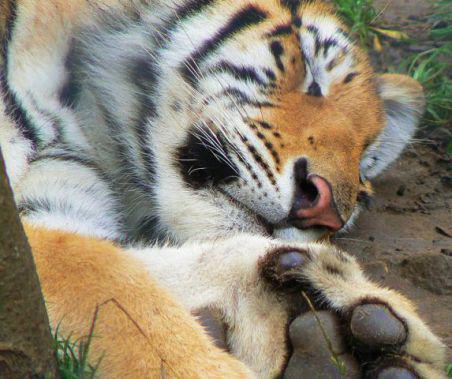Many people in Asia, particularly in China, believe that just about
every part of the tiger is good for treating some ailment. This has led
to a rather unsettling form of animal park where tigers are kept and
allowed to die from neglect and starvation. It is illegal to kill the
tigers, so to get around the law they just let them die while  Sleeping Tiger (Photo by Eddy Van 3000/Creative Commmons via Wikimedia)the
obligatory park visitors wander among the cages.
Sleeping Tiger (Photo by Eddy Van 3000/Creative Commmons via Wikimedia)the
obligatory park visitors wander among the cages.
At a park in Guilin, China, there exists the largest population of tigers in captivity. While the city is one of the most popular tourist destinations, this park is not on the itineraries of any of the foreign visitors. There are many reasons they don't want outsiders to see the park. The appallingly filthy conditions and lack of medical care for the animals are just for starters. The park is a sort of front for the tiger bone wine trade.
Once the suffering animals finally die, their carcasses are shipped over 200 miles to an underground facility where the tigers are skinned and the bones collected to be used to make the "medicinal" wine. In some cases the bones are ground up and added to the rice wine and in others the entire skeleton is soaked in the wine to create an infusion.
Conservationists are concerned that practices such as this will do more than their share to force several subspecies into extinction. This park and others like it are managing to operate on the outskirts of the law through practices such as letting the animals die rather than killing them. The government appears to be looking the other way.
China claims to have outlawed the sale and trade of tiger body parts, and have signed international wildlife agreements promising to ban the practice. However, the auctions for tiger wine continue to be held with throngs of bidders and a noticeable lack of police or other authorities.
Nations like the U.K. and India are calling on China to end these parks, which are essentially tiger farms, China has countered by insisting on proof that the farms are increasing poaching in the wild. No mention was apparently made on either side of the conditions that the animals are kept in on these farms, or the inhumane treatment of the animals there. China is also claiming that these demands are also attacks on their traditional culture.
A thriving black market operation in tiger parts still exists and little is being done to stop it. The bones are reputed to help cure everything from arthritis to ulcers, though science has not found health benefits linked to any part of the tiger.
The wine, which sells for more than $100 a bottle, is apparently a popular gift to give to a prospective business partner or a boss when a promotion is pending. It is also considered a sign of affluence in the growing wealth of the country, which is creating greater demand than ever for the wine.
For a complete report by the Environmental Investigation Agency on tiger wine operations, click here.
Sources: Mail Online, EIA, The Guardian, The Guardian, Tasting Argentina

